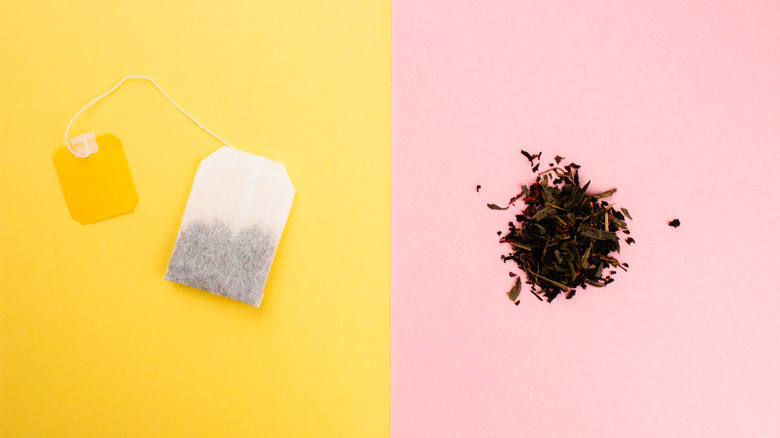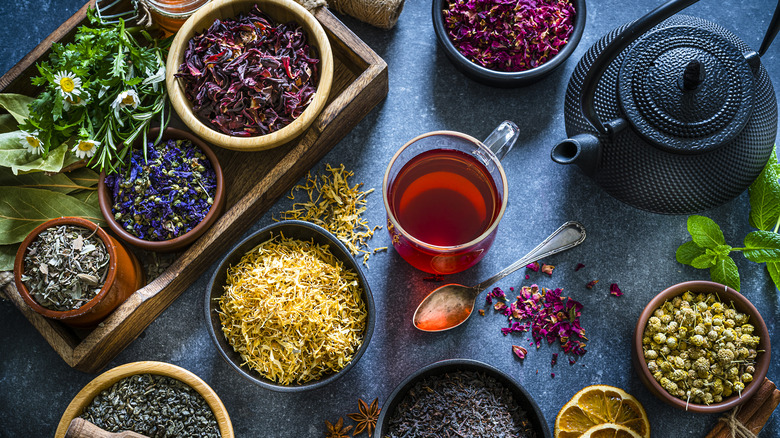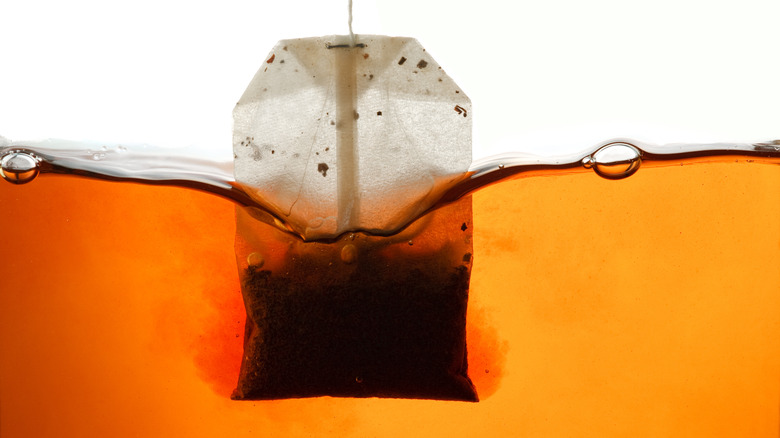Why You Should Be Brewing Loose-Leaf Tea Instead Of Tea Bags
If there's one culinary wonder that the world has in common, it's tea. Sipped hot or iced, the beverage is second only to water and has been enjoyed for millennia. Its earliest consumption traces back to China in 2700 B.C.E., when tea was primarily made for medicinal use. Almost 5,000 years later, the drink is consumed daily all around the globe. Besides its potential health benefits, tea is beloved for its flavor, energizing properties, and ritualistic brewing process. However, while preparing tea is often pleasant in itself, there are many ways to go about it.
With billions of gallons consumed each year, it's unsurprising that not everyone makes (let alone takes) their tea the same way. The drink is commonly brewed in two forms: bagged or loose leaf. In the U.S., about 70% of Americans use pre-portioned tea bags, according to 2019 data from Statista. Fittingly, the single-serving sachets were first invented and patented in the States in 1901 by two tea-savvy women tired of wasting leftover potfuls. Nowadays, there are many tools for steeping loose-leaf tea, the standard custom in countries like China and Turkey, the largest consumers of tea by volume and per capita respectively.
While bagged tea is convenient, loose tea leaves offer more control over each cup and a higher-quality flavor. Plus, it's better for the planet. So whether you're already an avid tea drinker or are switching from highly caffeinated cold brew, there are plenty of reasons to steep loose-leaf tea instead of tea bags.
Loose-leaf tea is better for customization and quality control
It might seem silly to pass up the simplicity of tossing a tea bag into a mug, but loose-leaf varieties open up a world of possibilities. They allow you to blend to your exact preferences, so you can recreate popular recipes or customize special blends. For instance, royal milk tea can be made with Assam, Darjeeling, and Ceylon black teas. Prefer a lighter-colored beverage? Use only Darjeeling. Want to limit the caffeine content? Rooibos is a reliable alternative. Similarly, chai blends might only feature one type of black tea, but you can make your own with multiple varieties for a more full-bodied brew. Anyone who takes their tea seriously will find that loose-leaf tea offers more creativity and control over each cup. Even Martha Stewart prefers it over bagged tea.
Loose teas also tend to be of better quality. Often hand-picked and more carefully processed, broken or whole loose tea leaves are bigger and higher grade. However, single-serving sachets are often filled with lower-grade tea dust or powdered fannings. Larger leaves better retain the original plant's flavors and aromas for a fresher, more pronounced taste, while ground tea might have very subtle herbal notes and taste bitter thanks to the tannins released during rigorous processing. Loose tea also has more polyphenols and catechins, chemical compounds with potential health benefits. So if you want to brew the best cuppa, whether for stronger flavor or your health, loose-leaf tea is the clear choice.
Tea bags aren't great for the planet (or you, potentially)
Besides the benefits of brewing loose-leaf tea, there are other reasons to avoid bagged tea. From an environmental perspective, the wastefulness of single-use sachets adds up, especially if you're drinking multiple cups daily. While you might think tea bags are compostable, the truth is that many — including those sold by Tazo, Celestial Seasonings, and Teavana — are manufactured with non-biodegradable plastic (via Center for Environmental Health). This is done to seal the bags so their contents don't spill into your mug. But composting them risks introducing chemicals to soil and any food grown in it.
The pollution problem is even more complicated. Research suggests that plastic tea bags can leach microplastics into hot water, according to a 2023 study from the International Journal of Surgery. It's impossible to say what exactly the implications are for you, the tea-drinker, as most people ingest microplastics regularly and unknowingly. While there are concerns about some, many more are still unstudied, per the International Journal of Surgery. At the least, their harmful impacts on wildlife and the food system show that plastic pollution is worth reducing.
However, you don't have to abandon bagged tea altogether. Brands like Yogi Tea and Traditional Medicinals are plastic-free. It's also easy to make tea bags from coffee filters using loose-leaf tea — and they can be composted, too. Still, for higher quality and unique tea blends, switching from bags to loose tea is still a no-brainer.


